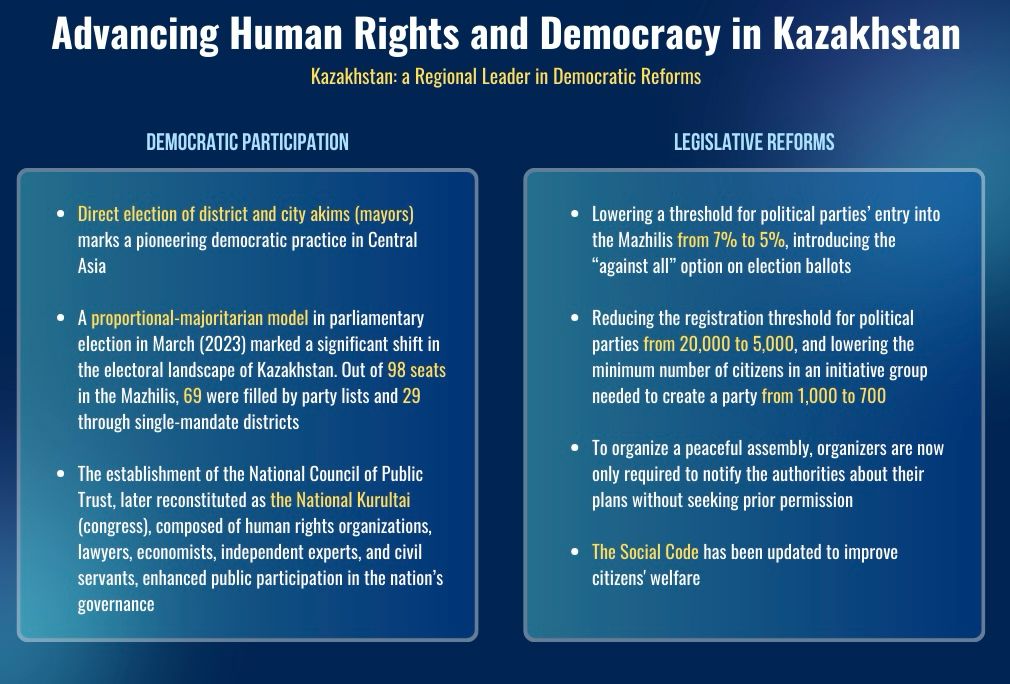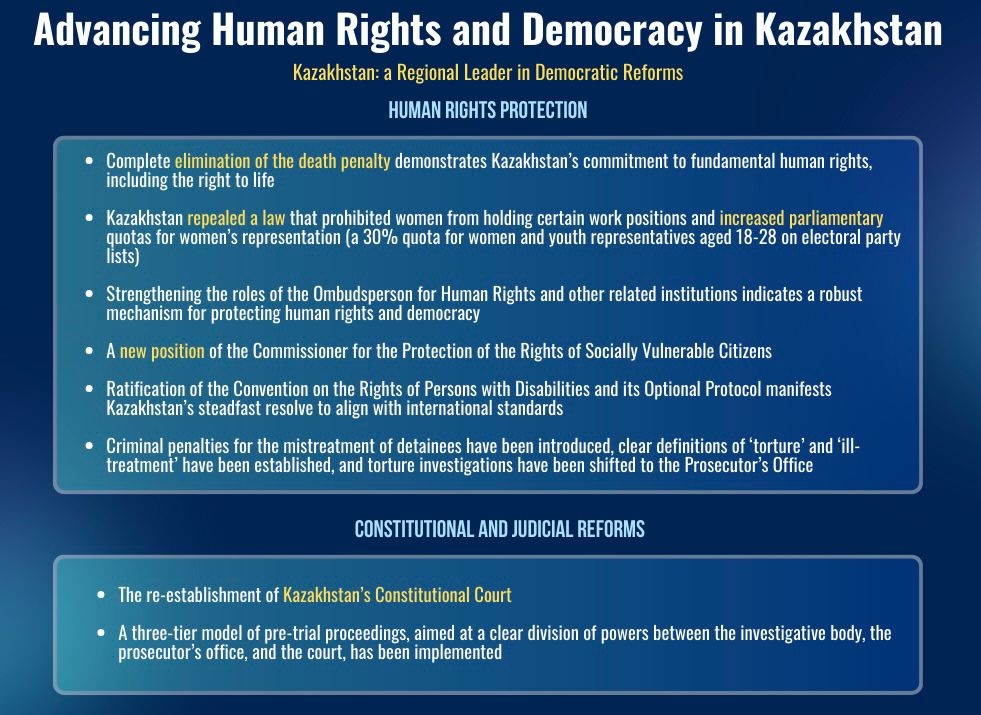Kazakhstan undergoes large-scale democratic transformations and made significant progress towards protecting human rights in full compliance with its international commitments.
Significant changes have been made to the legislation on democratic participation, human rights protections, and the rule of law.
This has:
- ensured greater participation by the population in the decision-making process as the concept of the “Listening State” continues to evolve;
- contributed to a more balanced political system and greater accountability to ensure the irreversibility of the ongoing political transformation towards a “Just and Fair Kazakhstan.”
Key Reforms
1. Democratic Participation:
- The presidential reform has enacted a limit of a single seven-year term for presidents, prohibiting re-election, and further strengthening Kazakhstan’s democracy.
- Presidential power over local office-holders has been abolished, and Presidential authority over the Senate has been reduced.
- The registration threshold for official political parties has been reduced fourfold – from 20,000 to 5,000. The registration rules have been relaxed considerably.
- Such liberalization has resulted in registration of new political parties - Baytaq and Respublica, with the latter winning parliamentary election together with established parties such as Amanat, Aq Jol, the Auyl party, the National-Social Democratic Party and the People’s Party of Kazakhstan in March 2023.
- The powers of the Majilis have been significantly expanded according to a new electoral model – based on party lists and single-mandate constituencies. Six parties were elected, three of which received parliamentary mandates for the first time, and one of which is an opposition party.
- Elections in the 2022-2023 period have resulted in unprecedented political competition in Kazakhstan and put a new, OSCE compliant elections regulatory system to the test.
- Political reforms introduced a quota for women, young people and persons with special needs on electoral party lists and in the allocation of parliamentary mandates.
- Elections of mayors of districts and cities levels were held for the first time in Kazakhstan’s history and resulted in nearly a 60% renewal of the rural political leadership.
- The power of local governments has been also expanded by transforming regional financing, and creating new regions in Abai, Ulytau, and Jetisu. Greater control over local governance has been given to local leaders.
- The Presidential Youth Reserve was created. Young professionals, who passed several stages of selection, are given the opportunity to take leading positions in the civil service.
- The National Council of Public Trust was reformed into the National Kurultai to bolster public participation in governance and the decision making processes that define the ideological and cultural parameters of Kazakhstan’s future development.

2. Human Rights Mechanisms:
- The reforms have strengthened the system of human rights protection. Legislative amendments have been adopted to strengthen the independence of the courts. The categories of cases for jury trials have been expanded.
- Kazakhstan has strengthened the power of national mechanisms to protect human rights. The institution of the Ombudsman for Human Rights, which has been given constitutional status, is fully functioning in the country. Kazakhstan has also appointed Ombudsman on Human and Children Rights and an Ombudsman with specific authority to protect the right of persons with disabilities in Kazakhstan.
- The Constitutional Court has been re-established with a strong mandate to boost the protection of fundamental rights and freedoms by giving citizens the opportunity to appeal directly to court.
- The Court represents a supreme body of constitutional control that ensures the supremacy of the Constitution. Its decisions have final force, even the President cannot revise its decisions, including those related to the constitutional rights of citizens.
- Any amendments and additions to the Constitution can be submitted to a republican referendum or to the Parliament, only subject to the relevant opinion of the Constitutional Court.
- Six of the eleven judges of the Constitutional Court are appointed by the chambers of Parliament. And the President [of the Court], although appointed by the President, is appointed only with the consent of the Senate.
- We have recently adopted a law regulating the procedure to petition the Government’s activity through filing online requests and monitoring it in an open and transparent way.
3.Human Rights and Rule of Law:
- The Social Code aimed at comprehensive support for vulnerable categories of citizens has been introduced. A special payment has been approved for persons employed in dangerous working conditions.
- The Presidential Decree on Human Rights and the Rule of Law has been signed in full compliance with Kazakhstan’s international commitments.
- Kazakhstan has abolished the death penalty, andtransferred some civic functions from the Ministry of Internal Affairs to the Ministry of Health to protect prisoners’ right to health. Ratified UN protocols on children rights and persons with disabilities.
- Strengthened criminal responsibility for torture, strengthened national mechanism of torture prevention, legally defined torture and ill-treatment.
- Administrative and criminal liability for domestic violence has been significantly strengthened. The possibility of repeated reconciliation of the parties in such cases has been eliminated.
- The legislative framework for payments from the National Fund to Kazakhstan’s children has been signed into the law.
- A new law on peaceful assemblies has been introduced with notification procedures that have significantly increased the number of peaceful meetings and rallies in Kazakhstan.
- The media law has been reformed in an effort to create a safer digital space.
